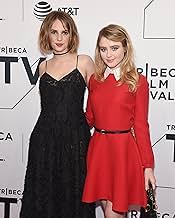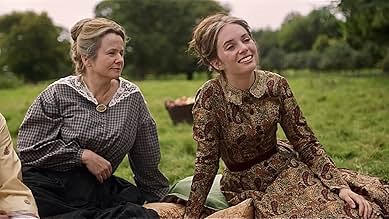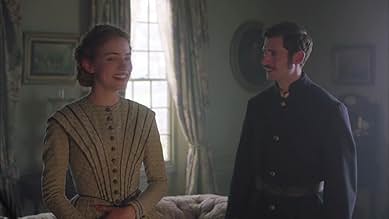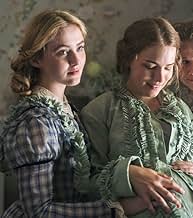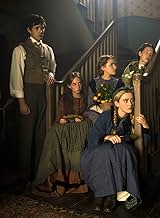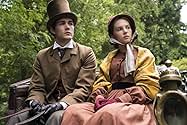Dramatization of Louisa May Alcott's novel about the lives of the four March sisters during the American Civil War as they learn to navigate love, loss, and the trials of growing up.Dramatization of Louisa May Alcott's novel about the lives of the four March sisters during the American Civil War as they learn to navigate love, loss, and the trials of growing up.Dramatization of Louisa May Alcott's novel about the lives of the four March sisters during the American Civil War as they learn to navigate love, loss, and the trials of growing up.
- Awards
- 3 wins & 7 nominations total
Browse episodes
Featured reviews
I was a bit dubious coming in, but I should have known with BBC and Heidi Thomas attached to it that it would be good. Mostly in my review I will address some of the complaints I have seen regarding the series, and how I believe they were minor, hopefully to encourage you to watch it! I don't believe you'll be disappointed.
Some of the other reviews have complained that it is very fast-paced and takes out many of the unique, quirky aspects of the March sisters and their lives. But omitting the charm and beauty of nature around them? it does not. The sets and shots of nature are beautiful and draw you into their world. Yes, we may feel that we don't get to know the sisters as well as in the book or in some other movie versions, but I believe the miniseries gives us a lovely glimpse into their lives for its length.
I worried about the acting, but everyone did a very fine job. I especially appreciate Jo, a perfect balance of boyishness and independence without being inappropriate to the time period. Amy, as many viewers has complained, was too old for the part in the beginning, and annoyingly had obviously dyed hair, but I was able to overlook these because I was enjoying the show so much, and believe me, I'm usually pretty picky and distracted by such things. Meg and Beth are my favourite people to play their respective roles.
The story does have a bit more of a modern feel, and as some have complained that carries into their speech, but it doesn't stand out too horribly. I didn't care for how some of the little happenings of their lives were switched around seemingly for no reason, especially how soon Marmee is called away to Father.
So, not perfect, but I enjoyed the 3 episodes very much. I cried several times at the very sad and sweet moments between the family, because, after all, I've read and watched the story ever since I was very small, and have 3 sisters of my own, and have gladly welcomed this new series into my heart. Hope you enjoy it too!
Some of the other reviews have complained that it is very fast-paced and takes out many of the unique, quirky aspects of the March sisters and their lives. But omitting the charm and beauty of nature around them? it does not. The sets and shots of nature are beautiful and draw you into their world. Yes, we may feel that we don't get to know the sisters as well as in the book or in some other movie versions, but I believe the miniseries gives us a lovely glimpse into their lives for its length.
I worried about the acting, but everyone did a very fine job. I especially appreciate Jo, a perfect balance of boyishness and independence without being inappropriate to the time period. Amy, as many viewers has complained, was too old for the part in the beginning, and annoyingly had obviously dyed hair, but I was able to overlook these because I was enjoying the show so much, and believe me, I'm usually pretty picky and distracted by such things. Meg and Beth are my favourite people to play their respective roles.
The story does have a bit more of a modern feel, and as some have complained that carries into their speech, but it doesn't stand out too horribly. I didn't care for how some of the little happenings of their lives were switched around seemingly for no reason, especially how soon Marmee is called away to Father.
So, not perfect, but I enjoyed the 3 episodes very much. I cried several times at the very sad and sweet moments between the family, because, after all, I've read and watched the story ever since I was very small, and have 3 sisters of my own, and have gladly welcomed this new series into my heart. Hope you enjoy it too!
7lthd
Amy was played by a 20 year old actress playing a twelve year old child. She was obviously too old, yet they insisted that she milk her childish ways (can you tie my skate, marmie says I'm old enough to do my own hair, etc.) to the point where I was actually laughing at scenes that weren't intended to be funny. Drug store box bleached hair (it was a ghastly shade of yellow), not a fitting actress for the part in any way. Enough said, Amy was everything that was bad about this film, well, almost.. They completely skipped the plays and left Jo and Laurie full drama.
To those who say this film is to the book, I ask, what book did you read? Some say they should have used British actresses. Why would they do that for a tale that took place in Massachusetts during the Civil War?
Did. I love it ? Yes! I just acknowledge that there were parts I couldn't get past.
Though I thought Beth had a bit of overkill, I thought the actress was fantastic and clearly played on the directors vision. She is a fantastic actress. I preferred Claire Danes but this woman (let's face it, she's over 20) is a brilliant actress. I think that the actress that played Marmie was possibly the best of anyone that I have seen tackle the part. She pulled raw emotion from me in a way that Susan Sarandon didn't (even though I loved her in the part). The real show stopper was Maya Hawke, as Jo. She was everything that is Jo for me. It was like she had leaped from the page. I loved her on Stranger Things and have been a fan of her mother and father ever since I was a child.
I loved that they led up to Jos Boys. I think in all they did a fantastic job, but I think That they should have sucked it up and used 2 actresses for Amy, and not this one. She didn't fit the part.
The performances of the young performers are so wooden. It lacks spirit. Disappointing.
Unlike many classic adaptations the BBC has released in the past, problem after problem weighs down Little Women and stops the series from being a truly enjoyable watch.
The book itself is largely written in a sweet, innocent voice/tone, and it works well within the text. However, when translating or trying to capture that same voice or spirit in actual dialogue for the screen, it comes off as amateurish or overly sentimental when spoken aloud. The text's tone is actually one of the reasons why this book is difficult to adapt. It is not the acting that lets the series down, rather it is the words that are unbelievable. People simply don't/didn't speak in such a way, even in the Victorian period. If this version is trying to modernize the girl's characters/eccentricities and the story's main message, why could it not modernize the language a bit or be a little more age appropriate- of course, still keeping it in line with the book's tone. An adaptation of Little Women should strike a balance between the two parts of the girls' and Laurie's journey into adulthood. First, establishing the way things are and have always been in the March home in a playful tone, and then, as they are forced to change through the circumstances of life and love, the tone becomes more heartwarming and more mature. From the get-go, this version applies a serious and mature tone despite the language used and the children's level of maturity, so, there is never a real transformation in character/perspective for any of the children, only in the circumstances they find themselves in.
Another glaring problem is the editing and structuring of the plot. Simply put, many scenes are too short; the scenes are like snapshots; they tell the basic story from a surface, visual level, but it lacks any depth, detail, or real explanation. This version misses the opportunity, being that it is longer and has more time, to include parts that have been left out of adaptations before it- parts that develop or establish the characters, their relationships, and their motives (examples, Jo visiting Laurie when ill, meeting Mr. Lawrence, Laurie's backstory and mother, the girls engaging in Jo's plays, Laurie joining in). Actually, this version excludes more than it adds, which is a little baffling. How can so much be glossed over?
The last problem is the accompanying score. If I am not mistaken, the music used within the series seems to be lifted from or inspired by the Radio 4 play of Little Women. Which is an odd choice, being that it is not of the period. Adding a modern score can work, but here, it is a miss-match.
Though the 94 film has its faults as well, it remains the best crack at adapting Alcott's work, which is disappointing seeing that the BBC had so much potential.
The book itself is largely written in a sweet, innocent voice/tone, and it works well within the text. However, when translating or trying to capture that same voice or spirit in actual dialogue for the screen, it comes off as amateurish or overly sentimental when spoken aloud. The text's tone is actually one of the reasons why this book is difficult to adapt. It is not the acting that lets the series down, rather it is the words that are unbelievable. People simply don't/didn't speak in such a way, even in the Victorian period. If this version is trying to modernize the girl's characters/eccentricities and the story's main message, why could it not modernize the language a bit or be a little more age appropriate- of course, still keeping it in line with the book's tone. An adaptation of Little Women should strike a balance between the two parts of the girls' and Laurie's journey into adulthood. First, establishing the way things are and have always been in the March home in a playful tone, and then, as they are forced to change through the circumstances of life and love, the tone becomes more heartwarming and more mature. From the get-go, this version applies a serious and mature tone despite the language used and the children's level of maturity, so, there is never a real transformation in character/perspective for any of the children, only in the circumstances they find themselves in.
Another glaring problem is the editing and structuring of the plot. Simply put, many scenes are too short; the scenes are like snapshots; they tell the basic story from a surface, visual level, but it lacks any depth, detail, or real explanation. This version misses the opportunity, being that it is longer and has more time, to include parts that have been left out of adaptations before it- parts that develop or establish the characters, their relationships, and their motives (examples, Jo visiting Laurie when ill, meeting Mr. Lawrence, Laurie's backstory and mother, the girls engaging in Jo's plays, Laurie joining in). Actually, this version excludes more than it adds, which is a little baffling. How can so much be glossed over?
The last problem is the accompanying score. If I am not mistaken, the music used within the series seems to be lifted from or inspired by the Radio 4 play of Little Women. Which is an odd choice, being that it is not of the period. Adding a modern score can work, but here, it is a miss-match.
Though the 94 film has its faults as well, it remains the best crack at adapting Alcott's work, which is disappointing seeing that the BBC had so much potential.
I have read Little Women so many times that I have lost count and was looking forward to seeing this rendition. What a disappointment. As others have mentioned the acting is mediocre at best and the script seems trite. I only watched about half of it and then tuned out.
Did you know
- TriviaDirector Vanessa Caswill expanded on the idea that historical accuracy and period authenticity was paramount. "We asked them to grow their underarm hair, because that would have been authentic, and not to have visible make-up because they wouldn't have worn any," she says. (Little Women Production Notes)
- GoofsIf Jo is old enough to attend an evening party, she would not be wearing her hair in a long braid, but up in the severe, center-parted styles of the period. Being old enough to put one's hair up and go to parties was an important rite of passage into adulthood, and even someone as unconventional as Jo would not have attended a social function with her hair down.
- ConnectionsFeatured in The South Bank Show: Heidi Thomas (2019)
- How many seasons does Little Women have?Powered by Alexa
Details
Contribute to this page
Suggest an edit or add missing content



